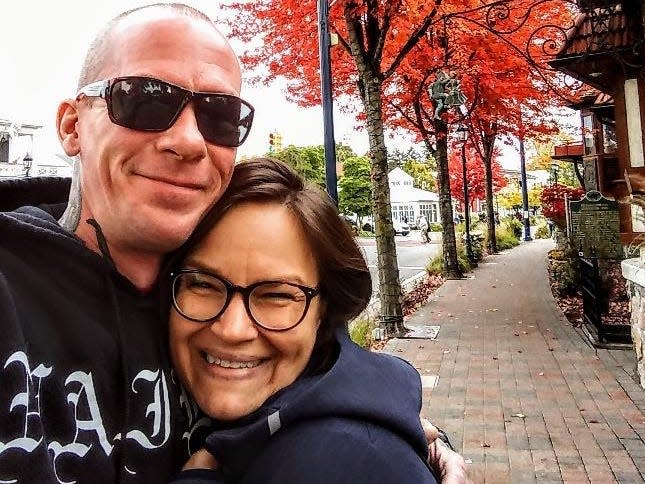A 45-year-old put off getting his stomach pain checked out. He was diagnosed with stage 3 colorectal cancer.

Jason Maman was diagnosed with stage three colorectal cancer after ignoring the symptoms for a year.
He experienced severe pain when going to the bathroom and blood in his stools.
Rates of colorectal cancer are rising in people under 50.
Jason Maman started experiencing discomfort when he went to the bathroom on and off in late 2018. A year later, he was diagnosed with stage three colorectal cancer at age 45.
Over the course of the year, his discomfort turned into extreme pain, and he would often bleed when passing stools. He thought he had a hernia or hemorrhoid and hoped it would go away by itself. But by mid-summer 2019, the pain got so bad on one occasion that he almost blacked out.
"I remember I was at work, I went to the bathroom, and it hurt so bad. When I stood up to leave and looked back, the whole toilet was blood red, literally," Maman, now 49 and a retail supervisor from Detroit, told Business Insider.
Even after that, he delayed getting his symptoms checked out for a number of reasons, from not wanting to take time out of his busy routine to spending money on tests.
But ultimately, he just didn't think it would be cancer. "It didn't occur to me going to the bathroom and having this pain that it might be cancer-related," Maman said.
"My inner monologue was, 'It'll be fine tomorrow, it'll be gone tomorrow,' and tomorrow would come, and it would still be there, and it would be, 'OK, well maybe the next day it'll be gone,'" he said.
His symptoms continued to get worse until he couldn't take the pain any longer and went to see a doctor in November 2019. He was told he had advanced cancer and would need urgent treatment and possibly a colostomy bag.
He'd been healthy most of his life, so Maman was shocked. Recalling the moment his doctor shared his diagnosis, Maman said: "The thought was kind of like, 'this can't be happening. That can't be right.' Fully knowing he was spot on."
Maman has been cancer-free for three years
Maman had twelve rounds of chemotherapy followed by 33 rounds of radiation therapy. The total medical cost of colorectal cancer care in the US was $24.3 billion in 2020, making it the second most expensive form of the disease, according to the Centers for Disease Control and Prevention.

His medical team wanted to shrink the tumor, which was low down in his rectum, but he needed surgery, meaning he will need a colostomy bag for life.
Dr. Claire Peeples, a colorectal surgeon at Corewell Health William Beaumont University Hospital in Michigan, who operated on Maman, told BI: "He did respond pretty well, but he still did have residual disease, and that's why we had to proceed with the surgery."
However, after three years of treatment, Maman is now cancer-free, and despite having lasting chemotherapy side effects, such as neuropathy in his hands and feet, his life has mostly returned to normal.
"There is life after a permanent colostomy. It doesn't interfere with anything. I can swim. There's nothing I can't do now post-cancer that I could pre," he said.
Cases of colorectal cancer in people under 50 are rising
Maman's case fits into a wider trend of rising rates of colorectal cancer in younger people. Cases have been increasing each year since the late '90s in those under 50, and deaths of people under 55 have increased by about 1% a year since the mid-2000s, according to the American Cancer Society.
"The last couple of years I've seen way more younger people coming in and being diagnosed with cancers. It's kind of staggering and very concerning to all of us," Peeples said.
Around one in three people diagnosed with colorectal cancer before the age of 50 have either a family history of the disease or a genetic predisposition, according to the ACS. Maman hasn't had genetic testing done but said that his dad was diagnosed with colorectal cancer when he was 70. He's now in remission.
"We do recommend genetic testing in somebody so young. It wouldn't have changed what we did in his case, but sometimes it can change outcomes for family and for his kids." Peeples said.
In general, she said if people notice any change in their bowel habits, such as sudden constipation or looser stools, it's always best to see a physician.
Colorectal cancer can also be partly caused by lifestyle factors such as diet. "I always encourage a high-fiber diet, and smoking and obesity can increase the risk of polyps," she said.
Colon and rectal cancer usually starts from polyps, which are clusters of abnormal cells that can develop into tumors, she said. They are often asymptomatic so it's important to get screened as the earlier they are detected, the easier they are to treat.
Maman was a chef for 25 years who was constantly on his feet, meaning he led an active life, but he said that his diet wasn't great and he was a smoker.
He shared his story to encourage other people to get tested. "That's a giant regret of mine that I didn't get checked out as soon as I started having discomfort. Had I caught it earlier, the colostomy could have been possibly reversed," he said.
"It takes no time out of your life at all to spend an hour or two or however long. Hopefully you don't have anything, but if you do, hopefully you catch it early and you won't have to live with a bag hanging off of you for the rest of your life," he said.
Read the original article on Business Insider

 Yahoo News
Yahoo News 
